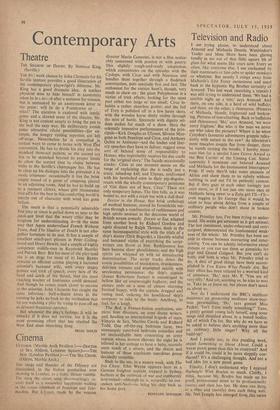Cinema
ULYSSES. (Marble Arch Pavilion.)—DOCTOR AT SEA. (Odeon, Leicester Square.).---THR BED. (London Pavilion.)—THE SEA. CHASE. (Odeon, Marble Arch.) THE surge and thunder of the Odyssey are diminished, in the Italian production now showing in London, to a faint, distant rumble. I he song the sirens sang disconcertingly re- veals itself as a somewhat lugubrious wailing in I he voices (dubbed) of Penelope and Tele- machus. But Ulysses, made by the veteran
director Mario Camcrini, is not a film notice- ably concerned with passion or with poetry. This slightly rough-and-ready adaptation. which concentrates on the episodes with the Cyclops, with Circe and with Nausicaa and bundles them together through a flashback construction, puts spectacle first and last. The enthusiast for the outsize hasn't, though, very much to chew on : the giant Polyphemus is a victim of trick effects, looking for the most part either too large or too small; Circe in- habits a rather cheerless grotto; and the fall of Troy is polished off in a few hasty shots, with the wooden horse dimly visible through the mist of battle. Spectacle with dignity sel- dom makes for much of a show. Here the solemnly impassive performances of the prin- cipals—Kirk Douglas as Ulysses, Silvana Man- gano as both Penelope and Circe, and Anthony Quinn as Antinous—and the leaden and liter- ary speeches they have to deliver, suggest some sort of belated sense of responsibility to Homer, who improbably receives his due credit for the 'original story.' The facade occasionally cracks: Circe at one moment seems on the verge of explaining that she is really just a crazy, mixed-up kid; and Ulysses, confronted with his bewitched crew in their pig-disguise, reacts with the wholly contemporary petulance of 'Get them out of here, Circe.' These are only temporary lapses. The film falls, as it was bound to, not with a crash but with a dull thud.
Doctor in the House, that brisk anthology of medical humour, scored its formidable suc- cess through a combination of ruthlessness and high spirits unusual in the decorous world of British screen comedy. Doctor at Sea, adapted from another book by Richard Gordon and again directed by Ralph Thomas, deals in the same inconsequential style with the trials of a ship's doctor (Dirk Bogarde), a likeably wistful and bemused victim of everything the script- writers can throw at him. Ruthlessness has here become sheer ghoulishness; and the high spirits are whipped up with an unendearing determination. The script tracks down the comic possibilities of seasickness, drunkenness, delirium tremens and attempted suicide with unrelenting persistence; the ship's captain (James Robertson- Justice) is encouraged to bellow like an overwrought foghorn; and the picture ends on a note of almost alarming farcical frenzy, with the captain, drugged and raving mad, ordering his bewildered ship's company to take to the boats. Anything, in fact, for a laugh.
The Bed, a Franco-Italian confection, em- ploys four directors, an even dozen writers, and, heading an international brigade of stars, Vittorio de Sica, Martine Carole and Richard Todd, One off-the-peg bedroom farce, two strenuously contrived bedroom comedies and an unclassifiable item concerning an army captain whose hostess chooses the night he is billeted in her cottage to have a baby, scarcely seem much of a return; and the charm and humour of these capricious anecdotes prove decidedly resistible.
Back to the sea, in a watery week, with The Sea Chase. John Wayne appears here as a German freighter captain, trapped in Sydney harbour at the outbreak of war and stubbornly determined—although he is, naturally, an out- spoken anti-Nazi—to bring his ship back to her home port.
PENELOPE HOUSTON


































 Previous page
Previous page